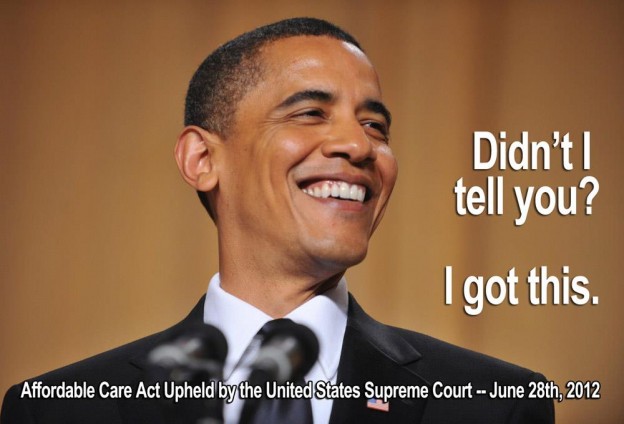
Health care law upheld
Can we finally stop calling it the “health care bill” now? Not only is it a law, it’s a law that has withstood a full-scale constitutional vetting by a conservative Supreme Court.
On a 5-4 decision, the Supreme Court upheld the Patient Protection and Affordable Care Act on Thursday. Chief Justice John Roberts wrote the majority opinion, which upheld the individual mandate under the federal government’s taxing authority. The decision also limited the ability of the federal government to withhold Medicaid funds to states that refuse to implement the Medicaid expansion contained in the law.
If you’d like to read the decision and the dissent, you can enjoy all 193 pages of legalese here.
Others will parse the decision with far more detail elsewhere, I want to briefly focus on the impact on Minnesota.
The one area in which the Court majority trimmed the ACA is it removed the ability of the federal government to take away all Medicaid funding if a state declined to participate in the ACA’s expansion of Medicaid to all adults under 133% of the federal poverty line. However, the federal government can withhold funding for the part that pays for the expansion. From the decision:
Nothing in our opinion precludes Congress from offering funds under the Affordable Care Act to expand the availability of health care, and requiring that States accepting such funds comply with the conditions on their use. What Congress is not free to do is to penalize States that choose not to participate in that new program by taking away their existing Medicaid funding.
In Minnesota, we’ve already opted into the Medicaid expansion. In fact, that was the first executive action of Governor Dayton, made possible by a provision in the agreement that settled the 2009 Minnesota legislative session. There may be other states that will decline to provide expanded coverage, and they will now be free to do so. But here in Minnesota, since we already provided some coverage for these adults under the General Assistance Medical Care and MinnesotaCare programs, opting into the Medicaid expansion was a no-brainer, practically revenue neutral.
The most salient and pressing issue for Minnesota is the implementation of a health care exchange. As part of the ACA, states must demonstrate to the U.S. Department of Health and Human Services by November 16, 2012 that they have a plan to implement a state health care exchange by January 1, 2014.
The Republican legislature has refused to consider bills that would have participate in planning a health care exchange, leaving the Dayton administration to plan it alone. Minnesota has secured over $28 million in grants from the federal government to implement an exchange, and the Dayton administration has spent $1.9 million to plan the development of an exchange. Sen. David Hann (R – Eden Prairie) and other Republicans have attempted to block this at several levels, challenging the authority of the Dayton administration to accept the federal grants, and blocking attempts by DFL legislators to get the legislature involved in the planning process. However, Hann has also said that the Senate GOP would not file suit to stop planning and implementation of a health care exchange by the Dayton administration.
The Dayton administration may be able to meet the November 16th deadline demonstrating that there is a plan in place, but ultimately, it will probably take legislative approval to implement a health care exchange. If legislative approval can’t be secured, Minnesotans will have to use the federal exchange. Given that Minnesota has been a national leader on health care reform, it would be a shame to defer on this opportunity to design a Minnesota-specific exchange.
The Court’s decision may provide the impetus for legislative action early in the next session. And, of course, the makeup of the legislature will have a big influence too.
Politically, while health care is a big issue for right wing activists, Minnesotans have been largely supportive of expanded health care programs in the past, and continue to be more positive about the health care law as a whole than the rest of the nation. If the instant reaction from partisans is to be believed, both DFL and Republican candidates will continue to make health care an issue, but probably mostly to fire up their bases.
Follow me on Twitter @aaronklemz
Thanks for your feedback. If we like what you have to say, it may appear in a future post of reader reactions.


